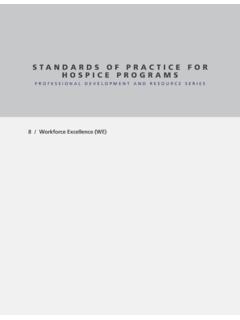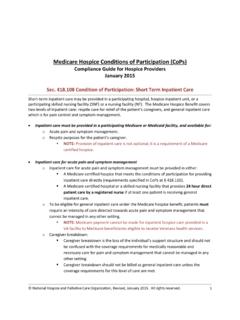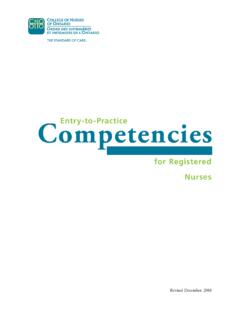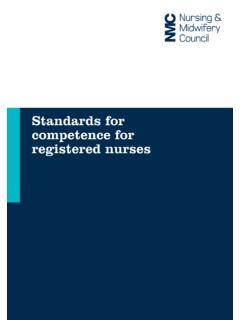Transcription of STANDARDS OF PRACTICE FOR HOSPICE PROGRAMS
1 STANDARDS of PRACTICE for HOSPICE PROGRAMS PROFESSIONAL DEVELOPMENT AND RESOURCE SERIES13 / Appendix I: HOSPICE Inpatient Facility (HIF) Patient and family/caregiver-Centered Care (HIF PFC) Ethical Behavior and Consumer Rights (HIF EBR) Clinical Excellence and Safety (HIF CES)Inclusion and Access (HIF IA) Organization Excellence (HIF OE)Workforce Excellence (HIF WE)Compliance with Laws and Regulations (HIF CLR)Stewardship and Accountability (HIF SA)Performance Measurement (HIF PM)PROFESSIONAL DEVELOPMENT AND RESOURCE SERIES13113 / appendix i: HOSPICE inpatient facility (Hif)IntroductionThe principles and STANDARDS in all chapters of the STANDARDS of PRACTICE for HOSPICE PROGRAMS apply to HOSPICE care in all care environments. The HOSPICE Inpatient Facility Appendix contains additional principles and STANDARDS that apply only to hospices that operate an owned or leased inpatient facility intended to provide HOSPICE patients with the general inpatient (GIP) level of care.
2 This appendix applies to General Inpatient (GIP) level of care. For patients on routine level of care please refer to the HOSPICE Residential Care Facility (HRCF) appendix. Hospices that operate an owned or leased inpatient facility must comply with applicable federal, state and local health and safety laws, regulations and codes unless specific waivers have been granted by the appropriate regulatory authorities. The inpatient facility and its staff must be appropriately licensed and, as applicable, certified to provide inpatient and family/caregiVer-centered care (Hif Pfc) Standard:HIF PFC 1: Nursing services are available on-site twenty-four (24) hours a day, seven (7) days a week to meet the patient s nursing needs in accordance with the HOSPICE general inpatient level of care and the patient s individualized plan of PFC A registered nurse , knowledgeable and competent in providing direct care to HOSPICE patients, is available on-site twenty-four (24) hours a day, seven (7) days a week.
3 Each patient must receive all nursing services as prescribed in the plan of care and must be kept comfortable, clean, well groomed, and protected from injury. HIF PFC Other nursing staff including registered nurses (RN), advanced PRACTICE nurses (APRN/NP), licensed practical nurses (LPN) or licensed vocational nurses (LVN), or HOSPICE aides (titles as defined by applicable law) are available to ensure that each patient s medical needs are met in a timely, compassionate, and professional PFC The HOSPICE has established policies regarding physician services to meet the patient s medical needs in accordance with the HOSPICE general inpatient level of care and the patient s individualized plan of care. STANDARDS of PRACTICE for HOSPICE ProgramS132 PRACTICE Example: The HOSPICE ensures that staffing schedules demonstrate that a registered nurse is always present to provide direct patient care and supervise other nursing staff providing patient care).
4 Standard:HIF PFC 2: The HOSPICE must designate a HOSPICE interdisciplinary team composed of individuals who work together to meet the physical, psychosocial, emotional, and spiritual needs of the patients and families/caregivers facing terminal illness and bereavement. HIF PFC Psychosocial and spiritual care are provided by members of the HOSPICE interdisciplinary team and/or counselors or social workers directly assigned to the HOSPICE inpatient Examples: A specific social worker is assigned to the HOSPICE inpatient facility to address the psychosocial needs of each patient and family/caregiver. A specific social worker is assigned to the HOSPICE inpatient facility to address the discharge planning and continuity of care needs of each patient and family/caregiver. Chaplains/spiritual caregivers trained in HOSPICE care make rounds at the HOSPICE inpatient facility to attend to the spiritual needs of each patient and family/caregiver.
5 A written schedule for after hours and weekend availability demonstrates that social worker and chaplain/spiritual caregiver services are available to address patient and family/caregiver needs. A bereavement counselor is available to provide services to family members/caregivers in need of additional support to cope with anticipatory grief and to prepare for the patient s :HIF PFC 3: The HOSPICE inpatient facility provides services designed to meet the unique nutritional needs of each HOSPICE PFC Dietary counseling, when identified as a necessity in the plan of care, includes education and interventions provided to the patient and family/caregiver regarding appropriate nutritional intake as the patient s condition PFC Meal planning and the timing of meals are discussed with each patient and adjusted, as reasonable and appropriate, according to each patient s preference, selection, and nutritional PFC Food and nutritional supplements are provided in accordance with the special dietary restrictions noted on the patient s plan of DEVELOPMENT AND RESOURCE SERIES133 HIF PFC The HOSPICE inpatient facility assures that food is procured, stored, prepared.
6 Distributed, and served under sanitary conditions and in a manner that is appealing to each PFC Any patient requiring assistance with meal planning and/or feeding receives such assistance by staff, volunteers, family members, or PFC Dietary counseling, when identified as a necessity in the patient s plan of care, is provided by qualified individuals, which may include a registered nurse , dietician, or Examples: Meals are individually scheduled allowing for frequent small meals if desired by the patient. Trained volunteers or staff members are available during meal times to assist patients with feeding as needed. Special dietary requirements are noted on the patient s plan of care and food is ordered and provided accordingly. Food, including between meal snacks or nourishment is available twenty-four (24) hours a day, seven (7) days a week to address the patient s reasonable requests and needs, unless limited by dietary restrictions prescribed by a physician.
7 If the dietary counseling needs of the patient exceed the expertise of the nurse , then the HOSPICE must have available an appropriately trained and qualified individual such as a registered dietitian or nutritionist to meet the patient s dietary needs. The dietitian or nutritionist must be a HOSPICE employee. Standard:HIF PFC 4: The HOSPICE inpatient facility assures that all medications and treatments are available as ordered to meet each patient s needs and are dispensed and administered in accordance with all applicable federal and state laws and PFC A licensed physician (or legal designee) orders all medication and treatment for each patient receiving HOSPICE general inpatient care, in accordance with the plan of care and applicable state and federal PFC Verbal/telephone physician orders are received, immediately recorded, and read back by the licensed individual.
8 The prescribing physician signs and dates the order in accordance with applicable laws and PFC Medications are administered in accordance with applicable laws and regulations and in accordance with each patient s individual medication record developed as part of the HOSPICE plan of PFC A HOSPICE that provides inpatient care directly in its own facility must provide pharmacy services under the direction of a qualified licensed pharmacist who is an employee of or under contract with the HOSPICE . The pharmacist s services must include evaluation of a patient s response to medication STANDARDS of PRACTICE for HOSPICE ProgramS134therapy, identification of a potential adverse drug reaction, duplicative or ineffective therapy, and recommendation of appropriate corrective PCF Patients receiving care in a HOSPICE that provides inpatient care directly in its own facility may only be administered medications by the following individuals:1.
9 Licensed nurse , physician, or other health care professionals in accordance with their scope of PRACTICE and state laws; 2. An employee that has completed a state approved training program in medication administration; and 3. The patient who may self-administer medications upon approval by the HOSPICE interdisciplinary Examples: The HOSPICE inpatient facility has a process to ensure timely signing and receipt of verbal orders. Medications are administered in accordance with physician orders and at the scheduled frequency. The HOSPICE inpatient facility has a process for obtaining required medications in a timely manner twenty-four (24) hours a day, seven (7) days a week. A medication administration record is maintained for each patient and each medication given is documented.
10 Infusion pumps have free flow protection and audible alarms. A medication reconciliation process is in place. The facility has a process for reporting medication events, such as errors or missing medications, and implements corrective actions accordingly. The facility has a process for safe disposal of discontinued/unused medications and controlled substances in compliance with the HOSPICE policy and in accordance with local, state and federal requirements. The HOSPICE maintains current and accurate records of the receipt and disposition of all controlled :HIF PFC 5: Death that occurs in the HOSPICE inpatient facility is handled with respect and compassion toward the patient and PFC Post mortem policies and procedures are in place and minimally include:1. Compassionate care and preparation of the body in accordance with the desires of the patient and family/caregiver; 2.















